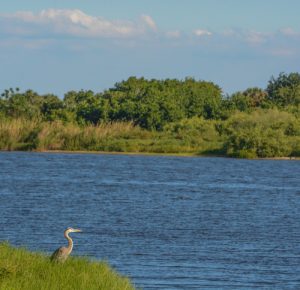
U.S. Rep. Brian Mast (R-FL) on April 13 sponsored legislation that would direct the U.S. Army Corps of Engineers to develop a comprehensive, multi-year plan to restore, preserve and protect Florida’s Lake Okeechobee and its northern coastal estuaries.
The Northern Estuaries Restoration Plan (NERP) Act requires the Corps to address harmful algal blooms and end toxic discharges from the freshwater lake, which is located in southeastern Florida, according to a bill summary provided by Rep. Mast’s office.
The NERP Act is modeled after the Comprehensive Everglades Restoration Plan (CERP) and would authorize work to eliminate the remaining discharges not stopped by the completion of CERP projects, the congressman said on Wednesday during a news conference beside the St. Lucie River near his Stuart, Fla., office.
“There’s no issue that impacts our community at a deeper or more destructive level than discharges from Lake Okeechobee,” said Rep. Mast. “The Everglades restoration infrastructure authorized by CERP is critically important, but we also must begin planning for what comes after, and that must include fully eliminating harmful discharges from Lake Okeechobee.”
If enacted, the Corps would be required to build more infrastructure to stop Lake Okeechobee discharges into the St. Lucie and Caloosahatchee rivers, as well as into the Indian River and Lake Worth lagoons, the summary says, and to improve the water quality of each of them.
Other objectives of the infrastructure would include restoring natural water flows and hydrological conditions; enhancing habitats, native vegetation and keystone species; and the dredging and beneficial reuse of harmful silt and muck from Lake Okeechobee, according to the text of the bill.
The Corps also would have to submit its plan to Congress three years after the law’s enactment for authorization and funding of the infrastructure projects.
Rep. Mast said his goal is to put existing/future infrastructure and current projects under one umbrella with the common goal to reduce harm to the lake’s estuaries, which millions of Floridians use for work, play and drinking water.



